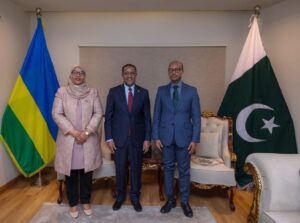Ngũgĩ wa Thiong’o, Icon of African Literature and Language Liberation, Dies at 87

Nairobi, The Gulf Observer: Ngũgĩ wa Thiong’o, the celebrated Kenyan author, scholar, and lifelong advocate for African languages and decolonization, has died at the age of 87. His family confirmed his passing on Wednesday evening, May 28, expressing both sorrow and pride at the end of a life deeply lived in the service of truth, literature, and liberation.
“It is with a heavy heart that we announce the passing of our dad, Ngũgĩ wa Thiong’o,” his daughter Wanjiku wa Ngugi wrote in a heartfelt Facebook post. “As was his last wish, let’s celebrate his life and his work. Rîa ratha na rîa thŭa. Tŭrî aira!” — a Gikuyu expression meaning “With joy and sorrow. We are proud.”
The family has asked for time to prepare and will soon announce details of memorial services, with Ngũgĩ’s son Nducu wa Ngugi set to serve as spokesperson.
Ngũgĩ’s passing marks the end of an era. Revered globally, he was not only a literary giant but also a fearless voice against colonial and neocolonial structures. His seminal works — including Weep Not, Child (1964), A Grain of Wheat (1967), Petals of Blood (1977), and Devil on the Cross (1980) — redefined African literature, centering African voices, identities, and languages in the post-independence narrative.
Born in 1937 in Kamiriithu, Limuru, Ngũgĩ’s early writings in English gave way to a determined turn toward Gikuyu — his mother tongue — a decision born out of his deep belief in linguistic decolonization. That choice, however, came at a cost. Following the staging of his revolutionary play Ngaahika Ndeenda (I Will Marry When I Want) in 1977, Ngũgĩ was detained without trial by the Moi regime, an act that would catalyze his long exile from Kenya.
Throughout his years abroad, teaching at prestigious institutions including Yale University and the University of California, Irvine, Ngũgĩ never wavered in his commitment to African languages, freedom of expression, and the transformative power of literature.
His influence extended far beyond academia. For generations of writers, activists, and scholars, Ngũgĩ was a beacon — proof that literature could be both artistically profound and politically revolutionary.
Tributes have begun pouring in from around the world:
Homa Bay Governor Gladys Wanga wrote:
“Sad to learn of the passing on of a literary giant whose words shaped African thought and inspired generations… Though he has left us, his legacy lives on in every story, every struggle, and every dream of a just world. Rest in power, Prof. Ngũgĩ. Heartfelt condolences.”
Revolutionary Writers’ Forum, Kong’amano la Mapinduzi, posted:
“He gave voice to the oppressed. Through his courage, he challenged systems. His stories live on in books, classrooms, and in the hearts of generations. Rest in power, comrade!”
Dr. Ezekiel Mutua wrote:
“Ngũgĩ became a towering figure and one of Africa’s greatest voices… My deepest condolences go out to his family and friends around the world. May his soul rest in eternal peace.”
Ngũgĩ is survived by his children and grandchildren, many of whom have continued his legacy as writers, academics, and artists.
As the world mourns his death, it also rises to celebrate a man who believed that language is not merely a tool of communication, but a vessel of identity, memory, and resistance.
In his own words:
“The choice of language and the use to which language is put is central to a people’s definition of themselves in relation to their natural and social environment, indeed in relation to the entire universe.”
Ngũgĩ wa Thiong’o may have departed, but his words — and his unwavering belief in the power of African voices — will echo for generations to come.


